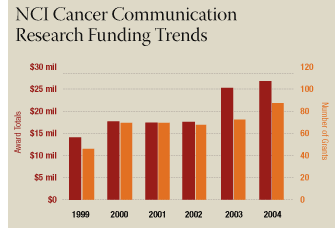 |
 According to a 2005 Pew Internet & American Life Project report, 79 percent of Internet users - roughly 95 million adults - search online for health information. That's close to half of all Americans: 51 percent of women and 49 percent of men. According to a 2005 Pew Internet & American Life Project report, 79 percent of Internet users - roughly 95 million adults - search online for health information. That's close to half of all Americans: 51 percent of women and 49 percent of men.
The report also showed that the most popular search topics for Internet users include specific diseases or medical problems, treatments and procedures, diet and fitness, and drug information.
However, even with all of the information available about cancer, many Americans remain misinformed. A recent survey of 957 adults from across the country, published online by the journal Cancer, showed that:
- 41 percent believed treating cancer with surgery can cause it to spread
- 27 percent believed there is a cure for cancer, but the medical community is keeping it a secret
- 19 percent believed pain medications are not effective against cancer pain
- 7 percent believed cancer cannot be treated, while 6 percent were unsure.
The study showed that residents of particular regions in the United States are not more knowledgeable about cancer issues than others, but interestingly:
- People in the Northeast were more likely to believe that cancer pain can be controlled
- Those in the South were more likely to believe that a positive attitude can cure cancer
- Residents of the Midwest were most likely to believe that cancer can be treated effectively.
|